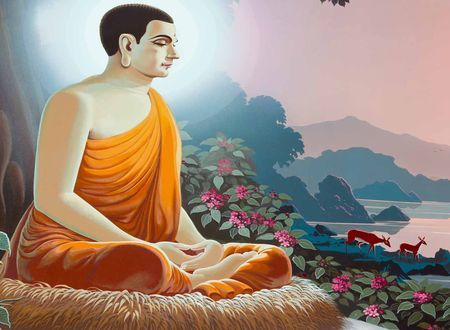The Training of Attention
Are You Mindfully Using Your Attention?
—
You know, everything we do—eating, drinking, sleeping, walking, talking, watching television or mobile, or simply passing our time doing something—we are actually training our minds to be in a certain way. Things we do routinely every day kind of trains our attention, largely unconsciously. And that’s why, when we try to focus on something which needs our attention for a duration of time, we find it difficult. That’s why we can’t meditate!
Because we sit for meditation only for that much time, but rest of the time we are training our attention in quite a contradictory way. We give up on our meditation when thoughts keep coming incessantly…and we ask “How to stop thinking?”. How would it stop?…when all the time we are constantly chattering both in our heads and in the outside world. We sit for meditation only for a few minutes, but we are training our attention to be diverted and diffused for the remaining hours of the day. How is that possible‽ It beats common sense. No?
So, what we are doing during the rest of the day, is equally important as the time we devote to meditation. If during the day we are practising mindlessness and distraction, then at the end of the day when we sit for meditation, hoping to have superior mindfulness and concentration is a fool’s wish, isn’t it? It’s not only ineffective but a foolish approach.
And if we don’t take charge of our attention, it’s going to be perennially distracted. If we have to reap the benefits of meditation, we have to take hold of our attention. And the things we do every day can be used as a great means to train our attention. So that when we sit for actual meditation, we have the necessary stability of the mind.
The Method
Now, how to train our attention? See, everything we do, if we do it mindfully and totally, it’ll train our attention. Mindfulness and total involvement are the keywords here. Mindfulness means the presence of mind, that the mind is not lost in thoughts, it’s present on the current task. While total involvement is the intensity with which we do something. For example, if you are listening to somebody, how mindful you are of the situation and how actively you are listening to that person, with how much earnestness and involvement. Are you getting me?
The impediment on the path of mindfulness and involvement is that our minds are distracted in many different streams of thoughts simultaneously. We rarely do something ‘singularly’, that is, to do one thing and one thing only at a time.
Our condition is, our minds are constantly over many places, here and also there. So, the challenge is to bring it to one place, to one thing, to one thought. This is the fundamental skill of meditation. To stop the wandering and to make the mind stable in one place.
There are many ways to do this. Chanting or japa is a great way to channelize the mind in one stream. Tratak or still gazing is another great way to develop the stillness of mind. Simple breathing meditation or sound meditation or visual meditation are also great ways. There’s another way—using our activities to develop the stillness of the mind. How? Very simple.
We just have to do whatever it is that we do dedicatedly. That means, to do only that and not engage in other activities for the time being. If we are about to sit for eating, for example, just eat, and do nothing else. For that ten or fifteen minutes, don’t use your mobile, don’t watch T.V, don’t engage in useless conversations, just eat everything with equal attention. If you have sat for study, study committedly. Tell yourself—”I am not going to do anything else as long as I study, I’ll just study”. If you are walking, walk with full attention, be attentive to your surroundings and movement. Walk with mindfulness.
In a nutshell, everything you do, do it with mindfulness and commitment. And complete your work. Never leave your work unfinished. It’s a bad habit. It shows a lack of patience and determination. However simple or small the task is, do it completely. This will help to develop the attitude of patience and mastery. Small things hold much significance when it comes to attention. Every small action counts. And if you use your activities to train your attention, great. Because then you are getting the opportunity to train your mind all the time. And what’s more, this approach also supports your actual meditation. Instead of becoming an impediment, it becomes your support system.
Last Words
Our attention is the singular most valuable resource we have. Our works, relationships, endeavours, love and even the work of self-transformation—attention is the basis of all this. The object (s) and quality of our attention determine the nature of our lives. So, it’s tremendously important to take our attention into control. I hope you’ll use the method delineated here.
Have a great life! Jai Shri Hari!
—









Comments & Discussion
12 COMMENTS
Please login to read members' comments and participate in the discussion.